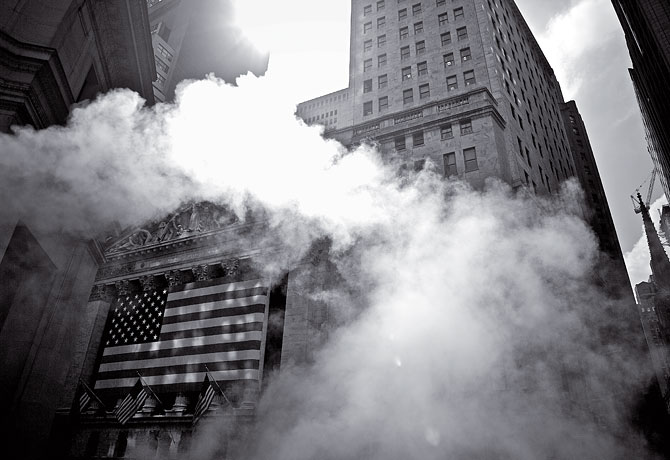
Losing steam
The financial crisis has challenged the capitalist myths justifying Wall Street's wealth and clout
(3 of 3)
In nations around the world — especially in the U.S. and Europe — this intellectual assault on financial capitalism is already bearing fruit. Regulators and legislatures are grappling with ways of recasting regulatory regimes so the financial system continues to provide those flows of capital without which innovation is impossible — what has been called the "utility" aspect of a financial system — while controlling the overleveraged risk taking that can bring a whole economy crashing down. As current Fed Chairman Ben Bernanke told TIME in December, "We do need to have an effective, comprehensive financial regulatory system that will essentially allow us to tame the beast so that it provides the benefits, the growth and development, without creating these kinds of crisis."
A New Landscape
Good luck with that, Mr. Chairman. Given the lobbying resources Wall Street can deploy in Washington — and the difficulty of getting any comprehensive reform of anything through an increasingly dysfunctional American political system — the prospect that a shift in the intellectual climate will lead to meaningful regulatory change is far from assured. We have, after all, been here before. In 1997-98, the time of the Asian financial crisis, Russia's default and the collapse of Long-Term Capital Management, the quintessential highly leveraged, efficient-market-hypothesis hedge fund, there was a similar intellectual backlash against market fundamentalism. It delayed a new wave of risky innovation in financial markets, by, oh, at least a few weeks.
Yet there is a crucial difference between the late 1990s and the present. In the earlier financial crisis, the source of the world's economic problem was widely thought to lie in the developing economies: in Southeast Asian nations whose supposed economic growth had masked a "crony capitalism"; in a Russia that could no longer pay its debts. The U.S., at the height of the long Clinton-era boom, was (as — remember? — the French used to say at the time) the world's hyperpower. It was U.S. action — the willingness of Americans to act as consumers of last resort — that would, and indeed did, pull the world away from the risk of global meltdown.
That is not remotely how things look now. First, the origins of the financial crisis lie in the U.S.; it was Americans who dreamed up the mathematical models that supposedly proved the efficient-market hypothesis and who preached to the world the virtues of light-touch regulation of financial markets. Second, the American consumer, desperately rebuilding domestic balance sheets after gorging on debt for a generation, is tapped out, in no shape to carry the burden of global economic recovery. And third, it is not developing Asia that stands as the exemplar of economic policymaking gone wrong, as it did in 1997; on the contrary, it is developing Asia — China and India especially — that is leading the world into recovery.
That is why the Great Recession is more than an economic phenomenon with its roots in an interesting moment in intellectual history. It is a geopolitical event of profound significance. Not just the U.S. economy and storied U.S. financial institutions have been humbled; so has an American way of thinking about the world. And that will have — has already had — consequences. "In the short term," said Lee Kuan Yew, Minister Mentor of Singapore, last November, "I'm certain that what's happened will accelerate the shift of economic weight from the Atlantic to the Pacific."
The U.S., it bears reminding ourselves, is by far the world's largest, most open and most innovative economy. Any list of the companies most likely to shape society in the next generation would be dominated by American ones. Western Europe remains the most populous region of peace and widely shared prosperity in the world. Asia's continued success is not assured. India faces enormous problems over the next generation: relieving dire poverty, improving a barely functioning education system, building a modern infrastructure. China's astonishing growth in the past year has been fueled by a central government that has forced banks to lend money to enterprises like a drunken sailor. Morgan Stanley's Roach figures that 95% of China's GDP growth in the first three quarters of 2009 was from fixed investments, a sign that China's economy is still led by investment, not consumption. It is only when the Chinese consumer starts spending more and the U.S. one starts saving more (the latter, it should be noted, is already happening) that the imbalances in the global economy will start to even themselves out.
Yet a shift in world economic and political power since the crisis took hold in 2008 is already apparent. It can be seen in the way the G-20, including representatives of the developing economies, has supplanted the G-8 as the primary forum for discussion of global economic issues; and in the new confidence developing nations bring to debates on everything from climate change to global economic policy. The world really has changed since the last time Davos devotees made their way up the mountain. You would not expect it in Switzerland, but those green shoots under the snow of the Graubünden might just turn out to be bamboo.